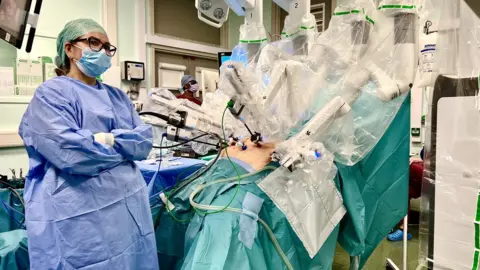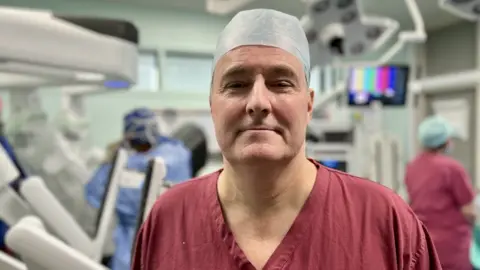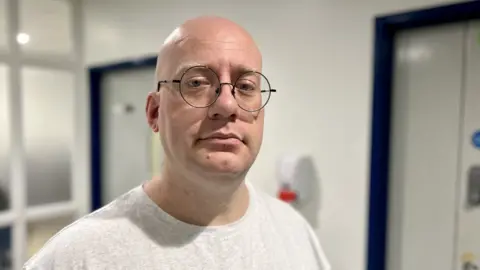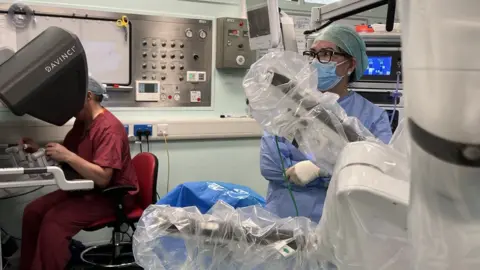Luton and Dunstable Hospital hopes robot could reduce weight loss surgery wait
A surgeon has compared robotic surgery to "flying a plane".
The specialist weight loss clinic at the Luton and Dunstable Hospital is using the "da Vinci Xi" for the first time.
According to the NHS, the number of bariatric surgeries last year was below pre-pandemic levels and it is hoped using the robot could speed things up.
"In this region hundreds of patients are waiting for this surgery" said weight loss lead, Doug Whitelaw.
"Across the country there are literally thousands of people waiting. We hope when the programme gets more developed we'll do more patients per day."
The team at Luton and Dunstable hopes the robot will help it increase the number of bariatric procedures from about three a day at the moment to four by the middle of next year.
 Nikki Fox/BBC
Nikki Fox/BBCThe £2m robot was funded with charity donations.
The robots have four mechanical arms, with a surgical instrument attached to each one. They are controlled by a surgeon seated at a computer console in the operating theatre.
The console gives the surgeon a magnified high-definition, view, so they can perform complex procedures with more precision and control than traditional surgery.
 Nikki Fox/BBC
Nikki Fox/BBCThe instruments move like a human hand, but can turn at a 360-degree angle, so the operation is carried out using just a few small incisions.
Mr Whitelaw said not being able to "feel" human tissue was "a bit strange" and took a bit of "getting used to", but he likened it to "flying a plane" or "playing a video game".
 Nikki Fox/BBC
Nikki Fox/BBCAccording to NHS England, in 2021-22, 4,400 surgical weight loss procedures were carried out in England. That is below the pre-pandemic figure of 6,400 in 2019-20. It is hoped the robot will help bring waiting times down.
Paul Dwyer, 41, from Milton Keynes, recently underwent a gastric bypass operation with the help of a surgical robot.
"I was really excited. I grew up watching Star Trek, so this was always something that was inevitably going to happen. It's going to have a fantastic impact on the quality of my life and the quality of life my kids are going to have."
 Nikki Fox/BBC
Nikki Fox/BBCMr Dwyer said he started taking weight loss seriously when his son was born five years ago. He has a second child due.
"Hopefully in the future, they can make those core memories with me; playing football, going for a long bike ride. Things that a five year old has that unlimited energy for."
At the time of surgery, Mr Dwyer weighed 21st (133kg) with a body mass index of 41. He said he had tried numerous weight loss programmes.
"I've done the milk diet, I've changed how I eat, I went vegetarian and vegan and tried low carb diets. I've not been able to maintain the weight loss."
Intuitive, the company behind the robot, said it was hoping to incorporate artificial intelligence within it in the future, to improve the surgeon's senses.
Data is being collected from every surgery the robot performs to help with development.

Follow East of England news on Facebook, Instagram and X. Got a story? Email [email protected] or WhatsApp 0800 169 1830
